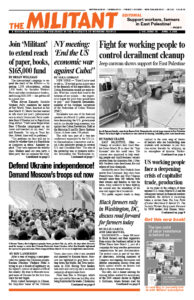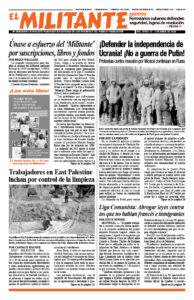WASHINGTON — Some 100 mostly Black farmers and their supporters from across the Southeast rallied at the White House here March 1, part of a campaign for long overdue government compensation for past discrimination. The protest came as part of two days of interviews, lobbying members of Congress and ongoing discussions and debates concerning lessons from past fights against attacks on farmers and what is the way forward today.
The rally, and a dinner meeting the evening before, marked the anniversary of the 1999 consent decree in Pigford v. Glickman, where farmers sued the U.S. Department of Agriculture for a long history of discrimination in loans and services. Many farmers were disappointed with the ruling because it allowed the government to avoid a trial in open court.
The event was organized by Tracy McCurty, executive director of the Black Belt Justice Center, a nonprofit advocacy group for Black famers; Lawrence Lucas, president of the USDA Coalition of Minority Employees, which joined many of the protests by Black farmers in the 1990s and had its own discrimination complaints against the USDA; and Lloyd Wright, the USDA’s director of civil rights in 1997-98.
Among the signs at the rally were “No check, no vote,” “We can no longer support the Democratic Party under these conditions,” and “No more auction block.” They also called for the ouster of Thomas Vilsack, secretary of agriculture in Joseph Biden’s administration.
The Socialist Workers Party, which has worked with a number of the farmers gathered here in opposing farm foreclosures and discrimination over decades, joined the activities to support the farmers. They brought a Feb. 21 SWP National Campaign statement by Ellie García, the party’s 2022 candidate for Senate from California, and carried placards reading, “Build an alliance of workers and farmers!”
The questions participants discussed over the two days are crucial for the line of march forward for all working people.
A delegation of 38 farmers and their supporters met with Senators Cory Booker from New Jersey and Elizabeth Warren from Massachusetts to discuss the recently introduced Justice for Black Farmers Act.
This bill was the result of recent developments. The Biden administration included payments to “socially disadvantaged” farmers to account for past government discrimination in his March 11, 2021, $1.9 trillion stimulus package. But after a legal challenge by well-funded conservative groups on behalf of Caucasian farmers saying they also deserved help, the program was dropped.
Skepticism about politicians
Many farmers here expressed skepticism about the usefulness of the meetings with elected officials. “We’ve done this way too long,” said Robert Binion, from Clanton, Alabama, who had taken part in meeting with Booker and Warren. “The USDA has been doing wrong to farmers — Black and white — for years.
“Now they want us to wait and be patient for nine more months? Why?”
Binion also questioned why the U.S. government gives billions to Ukraine and nothing to Black farmers. “The U.S. government is only looking out for its interests,” Atlanta SWP member Sam Manuel said. “But it’s a trap to counterpose the interests of workers and farmers in the U.S. to workers and farmers in Ukraine fighting the Russian invasion.”
At the opening dinner, García talked with Karla Bates, whose parents, Bernard and Ava Bates, lost their Nicodemus, Kansas, farm in 1988, and with Louisiana farmers Dexter Davis and Alfred and Edith Gross.
García met the Bates family at their farm foreclosure protest in 1983. Darrell Ringer, a Caucasian farmer, had organized the protest. In the 1980s the Socialist Workers Party joined with trade unionists and farmers who were organizing meetings, rallies and discussions to unite workers and farmers.
“We need an alliance of workers and farmers,” García said, “not the politicians of the two parties of the capitalist class. There are different classes of farmers, and our fights are class against class. We need a labor party that can fight for the interests of workers and farmers.”
She pointed to strikes by bakery union workers, union miners and rail workers as opportunities to build solidarity to advance such an alliance. “Being divided — worker against farmer, Black against Caucasian — only benefits our common oppressor, the capitalist class.”
“It used to be like that,” Edith Gross commented. “Everyone helping each other, now the white farmers are over there and we’re over here.”
Over breakfast the next morning Gross told García, “I was thinking all night about what you said about the unions and workers and the divisions. How come they came for the Black farmer first, before any other farmer? But then I thought, it is not a ‘me’ thing, it’s an ‘us’ thing. All farmers need to take caution, pay attention to each other’s struggles.”
Cuba’s revolution and farmers
García gave Curley Jackson, a 73-year-old tree farmer from Wilmar, Arkansas, a copy of greetings farmers in the U.S. — including two of the farmer protesters there, Willie Head and Eddie Slaughter — sent to the National Association of Small Farmers in Cuba in May. Jackson was surprised to hear that titles to their land had been given to tens of thousands of farmers during Cuba’s agrarian reform in 1959 and how land and industry there were nationalized. “I have never heard of that!” he said.
García said Cuban workers and farmers had taken political power, had formed their own government, a workers and farmers government, and nationalized the land, ending the rents and mortgages system. They distributed land to all peasants who wanted to farm. She showed him a copy of New International no. 4, which features articles on the crisis facing U.S. farmers and on Cuba’s agrarian reform.
“How do I get this book? I want to know more about the land titles. Why don’t I know about this?” he said.
Dexter Davis farms 1,000 acres of corn and soybeans in Sondheimer, Louisiana. In 2002 Davis and farmers from Georgia, Texas and Alabama organized a protest at the USDA office in Louisiana against government refusal to approve loans and other services to Black farmers. About 100 farmers participated.
“After that protest I couldn’t get a loan from the USDA either,” Davis said.
Three years later Davis was arrested on frame-up charges, which he fought successfully. But the time and resources taken to fight the false charges, on top of the USDA denying him a loan, led to his losing a lot of his farm. He said that all the land he purchased in rebuilding the farm came from Caucasian farmers.
Davis said he disagreed with the term “socially disadvantaged” farmers. “That’s a term the USDA put on us,” he said. “It’s to make you feel inadequate. Like you need help.”
Davis added that he also disagreed with the way the government claims to be helping Black farmers. “We don’t need separate pools of money for ‘socially disadvantaged’ farmers, Black farmers over here, Hispanic farmers over there, Native American farmers over here. That’s like taking us back to separate water fountains. We’re all just farmers!”
He said he does believe white farmers are better able to get what they need from USDA.
Mack Harmon is a retired farmer and volunteer firefighter, one of some 18 farmers who came to the rally from Alabama. He grew peanuts, watermelons, tomatoes and corn. “All working people need to be united to fight for our rights,” he said.
He recalled an incident when he worked at a Curtis Mathis TV assembly plant. He and a group of co-workers went across the street from the plant for lunch. “One of the guys with us was white,” he said. They took seats together in the back of the diner. “The waiter came over and told our white co-worker that he had to take a table up front and couldn’t eat with us in the back.” Harmon said his white co-worker looked the manager in the eye and said, “Either we all eat together, or I can’t eat here. That was in the ’60s!”
At the rally, Muhammad Robbalaa, a farmer from Fort Coffee, Oklahoma, pointed to the common history of struggle between Blacks and Native Americans. “Taking of the land of Native Americans and Blacks happened jointly in Oklahoma,” he said. Many Black freedmen and escaped slaves were living among the Seminoles who had been forcibly removed from Florida. “So, when land was taken from the Seminoles in Oklahoma it was also taken from Blacks.
“White farmers are also losing land to debts and speculators,” Robbalaa said. Asked how many farmers are left in his area, he said, “Three families,” all Black. “We’re all in this together and we all need to fight together.”
After two days of action and discussion, a number of the farmers and SWP members exchanged contact information to keep in touch through calls, email and future farm visits to continue the discussion started here.

